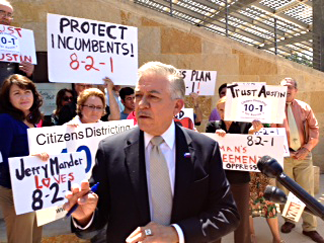Top Stories
Court halts $354 million development subsidy
Austin City Manager: Dallas discard vs Austin retread
Latest articles
Redistricting Need Not Be a Quintessentially Political Process
Quintessentially Political Process
Independent redistricting commissions for U.S. states and cities
Posted Monday, October September 24, 2012 6:05pm
Editor's introduction: Over the past 36 years attorney Steve Bickerstaff, adjunct professor at the University Of Texas School Of Law, has represented more than 100 jurisdictions on redistricting matters, including during the redistricting process, or before the U.S. Department of Justice, or in state or federal courts. These jurisdictions include the State of Texas (in three different decades) and various local governments (cities, counties, school districts, community colleges and special districts) in Texas and elsewhere. The electoral systems of these jurisdictions have included wholly at-large, wholly single-member, and hybrid or mixed (partially at-large) election structures.
He is author of Lines in the Sand (2007), a book about the controversial 2003 congressional redistricting in Texas; co-author of International Election Principles (2009); and author of 25 law journal articles dealing primarily with election law and telecommunications regulation.
Bickerstaff wrote the initial draft for the nonpartisan Citizens Independent Redistricting Commission. The Commission is an integral part of Proposition 3, which was put on the ballot through a petition drive conducted by Austinites for Geographic Representation. Bickerstaff’s draft was based on the Voters First Act, which through initiative and referendum established a system of independent redistricting in the State of California.
It is important that Austin voters have a thorough understanding of the Citizens Independent Redistricting Commission before casting ballots in the November 6 election. To that end, The Austin Bulldog is publishing Bickerstaff’s scholarly study of the strengths and weaknesses of various systems used for redistricting throughout the nation.
 Much has been written about the use of redistricting commissions for redrawing state legislative and congressional district lines. Twenty- two states now have some form of commission. However, the nature, jurisdiction and importance of these commissions vary greatly. By contrast, virtually nothing has been written about the use of redistricting commissions at the local level of government. This is particularly surprising because virtually all large and middle-size U.S. cities use at least some election districts that must be redrawn every 10 years, and because most of these cities are home-rule jurisdictions that generally have broad legal authority to adopt their own process for drawing local election district boundaries.[1] A purpose of this article is to provide government officials, public interest activists, and attorneys with a means for assessing the value of a municipal redistricting commission and for designing such commission to take self-interest and bias out of a process in which they have no legitimate role.[2]
Much has been written about the use of redistricting commissions for redrawing state legislative and congressional district lines. Twenty- two states now have some form of commission. However, the nature, jurisdiction and importance of these commissions vary greatly. By contrast, virtually nothing has been written about the use of redistricting commissions at the local level of government. This is particularly surprising because virtually all large and middle-size U.S. cities use at least some election districts that must be redrawn every 10 years, and because most of these cities are home-rule jurisdictions that generally have broad legal authority to adopt their own process for drawing local election district boundaries.[1] A purpose of this article is to provide government officials, public interest activists, and attorneys with a means for assessing the value of a municipal redistricting commission and for designing such commission to take self-interest and bias out of a process in which they have no legitimate role.[2]
Barrientos Lampoons Prop 4 With a Fable
Other proponents of alternative plans for
geographic representation push their points
by Ken Martin
© The Austin Bulldog 2012
Posted Friday, September 14, 2012 3:07pm
 The passion and political experience of retired State Senator Gonzalo Barrientos (D-Austin) lifted the crowd of some 40 interested citizens who had come to hear a debate about what system should govern how Austin City Council members are elected.
The passion and political experience of retired State Senator Gonzalo Barrientos (D-Austin) lifted the crowd of some 40 interested citizens who had come to hear a debate about what system should govern how Austin City Council members are elected.Scene: A debate forum hosted by Southwest Key’s VOTA! Campaign at the organization’s headquarters in far East Austin.
Enter Barrientos: arriving 20 minutes after the program started and a bit flustered from being stuck in traffic.
When his turn to speak came, the former lawmaker drew on his storytelling ability to attack the council’s action to put the 8-2-1 plan (Proposition 4) on the same ballot with the citizens’ 10-1 initiative (Proposition 3).
“In the time of Christ,” he said, “there were two stores on the opposite side of a street. The owners didn’t like each other.
Proposition 3 Advocates Falsely Slam RECA
Proposition 3 Advocates Falsely Accuse RECA
Group alleges ‘rumor’ of $100,000 pledge by Real Estate
Council to defeat Proposition 3, but RECA says not so
by Ken Martin
© The Austin Bulldog 2012
Posted Wednesday, September 12, 2012 10:25pm
An e-mail received early this morning from Austinites for Geographic Representation (AGR), that was titled "A Very Stinky Rumor" turned out to be stinky indeed—as in false.
Or so says the Real Estate Council of Austin.
The AGR e-mail stated, "Rumors are flying that large real estate investors at the Real Estate Council of Austin (RECA) just pledged $100,000 to stop Prop 3—the people's plan for geographic representation—by running a confusion game with Prop 4."
No-Change Option Surfaces in Ballot Debate
Former Council Member Bob Binder opposes both
options on the ballot for geographic representation
by Ken Martin
© The Austin Bulldog 2012
Posted Tuesday, September 11, 2012 2:41pm
Monday's lunchtime debate drew about 40 people to hear arguments for not just Propositions 3 and 4 on the November 6 ballot, but reasons why voters should once again turn thumbs down to both plans for geographic representation in City Council elections.
 The program was hosted by the Central Texas Democratic Forum, emceed by attorney Chuck Herring of Herring & Irwin LLP.
The program was hosted by the Central Texas Democratic Forum, emceed by attorney Chuck Herring of Herring & Irwin LLP.
Until this debate, virtually all discussions about how council members should be elected have focused on the problems with the current all-at-large system and advocated for one of two proposed plans for change.
The Election Wars Have Begun
Interest in how council members elected
running high, as face-off debates abound
by Ken Martin
©The Austin Bulldog 2012
Posted Sunday, September 9, 2012 9:01pm
If you're concerned with how your local city government officials get elected—and how any change in the election system might affect your interests—you will have numerous opportunities to hear a thorough airing of the issues.
Two propositions on the city’s November 6 ballot offer choices for getting away from the all-at-large system we've had since 1953, when the council had five places and the elected council members chose the mayor from among their ranks. The council was expanded to seven places beginning with the 1969 election but it wasn’t until 1971 that citizens could directly elect their mayor.
Today, there are some who advocate keeping the election system we’ve got. However, the two major factions striving for change both advocate a new system of electing council members.
How to change is where they differ.
Investigative Reports
For more than a decade the Bulldog has published hard-hitting, in-depth investigative reports that have shaped civic discourse and public policy, resulted in criminal prosecutions, and enlightened voters about candidates' records. Here are a few samples of our work:
About us
The Austin Bulldog is the premiere investigative journalism outfit in Central Texas. Established in 2009, the Bulldog has become a trusted independent voice for government accountability, known for its incisive, in-depth coverage of local elections and local governments.
Newsletter
Keep up with the best investigative reporting in Austin.
Follow us
Bulldog Team
Ken Martin
Founder and EditorOur critical accountability journalism wouldn't be possible without the generous donations of hundreds of Austinites. Join them and become a supporter today!
Areas of Coverage
Austin City Manager: Dallas discard vs Austin retread
Lame duck council set to vote on 20-year sweetheart tax deal for developer
Environmentalists assail plan for lakeside high rises
Urbanists vie to replace council member Kathie Tovo
First-ever opportunity to elect appraisal board members
District 10 Council candidates jump in early
Announcing the Government Accountability Project
Central Health launches search for new CEO
First-ever opportunity to elect appraisal board members
Announcing the Government Accountability Project
Project Connect
Lawmakers weigh axing Project Connect’s ‘blank check’ loophole
Project Connect scope drastically scaled back
Austin Transit Partnership gears up for key decisions on light rail design
Become a Bulldog supporter
The Bulldog is funded by its readers. We're not affiliated with any political party or interest group. We're not paid by corporate sponsors. Support us today so we can continue to be a trusted voice for government accountability.







